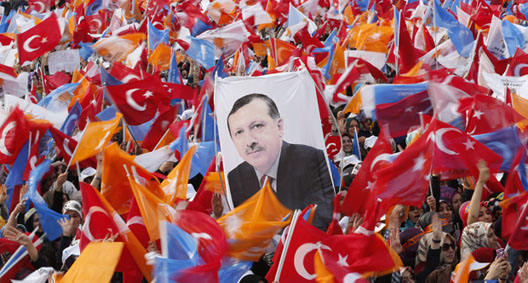 Voters in Turkey will elect mayors and local councils Sunday in an act that will resonate far beyond the local issues that typically dominate municipal elections. They will deliver a referendum on the 11-year rule of Prime Minister Recep Tayyip Erdoğan. And the balloting will open a cycle of three elections in coming months that may determine how this regional power of 74 million people will be governed until 2023, and whether it still can be a rare model of democracy and stability in the Middle East and Eurasia.
Voters in Turkey will elect mayors and local councils Sunday in an act that will resonate far beyond the local issues that typically dominate municipal elections. They will deliver a referendum on the 11-year rule of Prime Minister Recep Tayyip Erdoğan. And the balloting will open a cycle of three elections in coming months that may determine how this regional power of 74 million people will be governed until 2023, and whether it still can be a rare model of democracy and stability in the Middle East and Eurasia.
Erdoğan’s responses to rising challenges to his rule – most recently to the prominent corruption charges issued in December that led to the resignation of three of his cabinet ministers – have damaged Turkey’s democracy. His government has imprisoned large numbers of journalists, undermined the independence of the judiciary, re-assigned thousands of police officers connected to the corruption investigation, and blocked access to Twitter and YouTube. Under the pressures, tear gas has become a weekly nuisance on Istanbul’s main shopping street and TV channels have stopped reporting breaking news.
The elections will be a test for Turkey’s role as a key European and US ally. Until recently Erdoğan’s government was seen as a potential model for political development in the Islamic and Turkic worlds, especially as a candidate for European Union membership since 1999. In the past two years Turkey’s democratic credentials have weakened, EU negotiations have stalled and interest among Turks in joining the European bloc has decreased. Erdoğan’s government has taken positions, especially vis-à-vis Israel and in Syria (where it has given free passage to jihadist groups), that have eroded US trust in Ankara. If there is fraud on election day, it will further undermine what has become a fragile alliance between Turkey and the transatlantic community.
Sunday’s local elections will be followed in August by Turkey’s first-ever direct election for the presidency and by parliamentary elections, which are scheduled for 2015 but could be held earlier. Whether these votes further inflame political tensions or help resolve them will depend largely on whether the voting is considered free and fair, and whether Turkey’s Supreme Board of Elections retains its image of impartiality.
Erdoğan has been extremely active on the campaign trail and his image adorns the posters of many local AKP candidates. The prime minister is using this election to determine whether he has enough popular support to comfortably gain the 50 percent of votes needed in August to win a presidential race without a runoff election. If not, he might try to stay on as prime minister beyond 2015 by changing rules within his Justica and Democracy Party (AKP) that prohibit a leader from seeking a fourth term. AKP insiders like President Abdullah Gul and Deputy Prime Minister Bulent Arinc probably also are waiting for the poll results to determine their future political moves, including whether to remain supportive of Erdoğan’s continued dominance of the party. Poor AKP results could encourage Gul to run for re-election as president.
Sabine Freizer is a nonresident Senior Fellow with both the Dinu Patriciu Eurasia Center and the Transatlantic Relations Program.
Image: Supporters hold a portrait of Prime Minister Recep Tayyip Erdoğan while waving Turkish and AK Party flags during an election rally in Istanbul March 23, 2014. REUTERS/Murad Sezer
